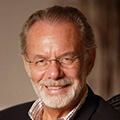Oklahoma, a land of diverse landscapes and rich cultural tapestry, has incubated some of history's prolific writers. From the bustling energy of its cities to the untamed beauty of its natural resources, the state has provided a canvas for the vivid imaginations of authors who have left an indelible mark on literature.
In the heart of this literary haven, figures like Angie Debo, Michael Wallis, Guy Logsdon, and Dave Whitlock have woven narratives that mirror the essence of Oklahoma's vibrant culture. As we delve into the lives of these remarkable writers, the threads of history, storytelling, and nature intertwine to create a tapestry that reflects the resilience, creativity, and diversity that characterize the spirit of the Sooner State.
Join us as we explore the lives and contributions of Oklahoma's literary luminaries, each leaving an enduring legacy that enriches our understanding of history, culture, and the profound connection between writers and the landscapes that inspire them.
Angie Debo
Angie Debo, born on January 30th, 1890, became one of the greatest historians to ever come out of Oklahoma – with her body of work spanning numerous articles and thirteen books on Native Americans in Oklahoma.
One of her most prominent writings was And Still the Waters Run, which was a revealing expose addressing a criminal conspiracy to cheat Native Americans out of their property. She is one of the most influential figures in preserving Oklahoman history today.
All that said, Angie Debo’s origins were just like every other little Oklahoman girl at the time: she gained her primary education in a one-room schoolhouse and rode to school on a pony. However, her knack for education and teaching others very quickly surfaced when she started teaching in rural schools by age sixteen before enrolling in high school and moving on to the University of Oklahoma.
During her exploration of the academe, Angie Debo has her first brush with gender discrimination – a force that would continue to impact her career for years to come. Despite her stellar performance during her graduate studies, Debo was overlooked for higher positions and recognition, but still, her dedication to producing good work endured.
She then went on to become a woman on the frontline of truth by exploring the concept of ethnohistory, with a pronounced focus on developing more holistic, nuanced retellings of Native American history beyond government documents and how outsiders viewed them. This was demonstrated in her 1934 book The Rise and Fall of the Choctaw Republic.
Despite her demonstrated excellence, Debo was still passed over for teaching positions due to societal expectations of women – namely that they belong at home with the family – and she grew increasingly frustrated before moving on to publish more books about Oklahoman history.
Angie Debo passed away at 98 on February 21st, 1988, but she lives on through Dr. Patricia Loughlin’s admiration and upcoming book. According to Dr. Loughlin, Angie Debo would have encouraged today’s would-be writers and historians to speak up, persevere, and take advantage of every opportunity given to them:
“I think she would encourage them to write more, to share their work, to speak up in class, to ask questions, to take advantage of opportunities that your teachers provide to you, or your parents, or your community members, to get out there and visit places in the state of Oklahoma and think about the history of our state and be proud of it.
She would also encourage people to get out of Oklahoma sometimes and to travel throughout the country and visit places in the world when you have the opportunity. And she would say, ‘Live a full life, ask questions, speak up, share your expertise with others, and do not give up.’”
— Dr. Patricia Loughlin on Angie Debo
Chapter 16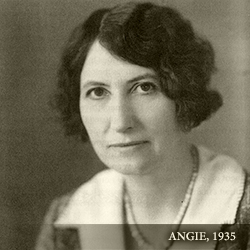
Michael Wallis
There aren’t many people who can say that they’ve written books about cars while also being in the 2006 Pixar film Cars, but Michael Wallis can. Born on the 7th of October in 1945, this Tulsan native is the first person to be inducted into the Oklahoma Route 66 Hall of Fame for his historical works and biographies.
His love for storytelling was handed down to him as a child from his German immigrant grandmother, who recalled her life experiences with incredible detail – sparking Michael’s interest in preserving and sharing stories, which later extended to the American West and Route 66.
His parents further encouraged this as he grew up both in and out of military school, and Wallis credits his visits to the Rock Hill public library on Route 66 as the reason storytelling became such a compelling calling for him. Reading the classics like the Hardy Boys, Huckleberry Finn, and Buffalo Bill augmented his already voracious appetite for fiction. It gave him the tools to win writing contest after writing contest.
Eventually, he dropped out of college to join the Marine Corps to distinguish himself among his peers. Afterward, he picked up a few college credits and worked various jobs, from lab to social worker. Sometime during his stint as a self-described “renegade social worker”, Michael met Judy Baker and later married her – but this didn’t last long.
Ill-prepared and busy with college courses, Michael’s first marriage began to dissolve when he met his Spanish professor, Suzanne Fitzgerald, and they ended up in Santa Fe. Meanwhile, Judy was back at home having their child, though Michael sent payments to support her. Later, he connected with his son and found that he had become quite the artist.
Over the next few decades, Michael’s career and creativity flourished as he transitioned from being a reporter covering exciting corners of the United States to later becoming a PR man, founding his firm with two others. However, the foundation of Wallis-Gideon-Wallis (his firm), meant that he would go on the first six months without a salary – which inspired Michael to dip his toes into writing his first book, “Oil Man.”
His success with PR and his books meant that Michael gained his fair share of recognition, which ended up landing him a role as the voice of the mayor of Radiator Springs in the Pixar movie Cars – a pretty good match for the man who had written about Route 66 time and time again.
Today, Michael Wallis enjoys the fruits of his labor and has some sage advice for would-be writers:
“A lot of writers will tell you this and it’s very interesting, yet often times you will do everything you can in your power to keep from writing. You will let yourself get sidetracked. There are lots of seductions. It could be the Internet. It could be friends. It could be the phone. Sometimes you even doubt yourself and you think, God, they are going to catch on to me here–this is really junk. That’s okay. It’s okay to question yourself and test yourself and have doubts.”
— Michael Wallis
Chapter 20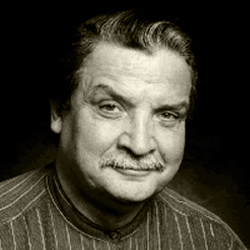
Guy Logsdon
Dr. Guy Logsdon, born on May 31st 1934, was notable on his own, but his focus on the careful preservation of different Oklahoman musicians’ legacies is what cemented him as one of the state’s most influential writers and historians. His body of work includes memoirs and biographies on important musical cowboys like Woody Guthrie and Tommy Allsup, and western swing music as a whole.
Guy Logsdon grew up in a family of mixed Native American and African-American descent, though this heritage is marked by layers of complex implications because of Oklahoma’s storied past. Despite these complications, his family always had music to lean back on in the hard times – though that was almost not the case for Guy himself.
As a child, his parents believed him to be “late-talking” because he didn’t take to speaking as quickly as other children – and thus he wasn’t encouraged to take up music like his siblings were. Similarly, music teachers didn’t have much of an interest in teaching him, and Guy was left to teach himself guitar and the bass fiddle instead.
“And that explained many things to me. I was never encouraged musically. Everyone else in the family. I wanted to take piano lessons and up the road and up a hill the Lucas family had this big, old, old-time rock house, it’s now been torn down, but she was a piano teacher. And my sisters took piano up there.
So I went up by myself and said, “I’m going to take piano.” Second grade.”
— Guy Logsdon
Chapter 06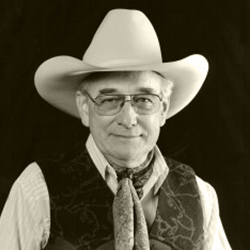
Despite the initial skepticism around Guy’s musical talents, he went on to become the person to go to about western swing, and it all started when he sang in a high school band called the Diamond Dee Boys. His maiden performance was a cover of “Milk Cow Blues” by Cotton Thompson, and his peers loved the band’s performance, which served as the catalyst for the rest of Guy’s development as a musician and historian.
Afterward, he went on to earn his bachelor’s degree at East Central University in Ada before obtaining a master’s degree and Ph.D. in education. This led to him becoming a professor of education in American folklore at the University of Tulsa while also being actively involved with the Methodist church – so much that he eventually became a licensed minister. He also later met his wife, Phyllis, at a Methodist church camp.
From then on, his work became a representation of how he overcame the odds that were stacked against him and found a real love for music, storytelling, and history along the way. His contributions to the preservation of Oklahoman history endure to this day through books, museums, and foundations.
Dave Whitlock
Dave Whitlock is in a fly-fishing league of his own, and his story is a little bit different from the others in this article. Not a historian nor a fiction writer on his own, Dave authored and illustrated dozens of guides and books on fly-fishing – and this wasn’t just to toot his own horn. He is widely considered one of the best fly fishers in the world, but not quite in his home state of Oklahoma.
But let’s start at the beginning. Born in 1934 on the 11th of November with a spinal condition that weakened his back significantly. This, combined with the contraction of rheumatic fever and polio at five years of age, resulted in a very difficult childhood spent in the Crippled Children’s Hospital. Unfortunately, this made the young Dave Whitlock feel rather abandoned during his time in the wards.
Luckily, he eventually recovered albeit with some disfigurement in his leg due to the nature of the illness – and his experiences allowed his family to rally behind him while also discovering his innate strength and resilience. It was also from his family that he discovered fly fishing, though it was described to him as a “rich man’s sport.”
Despite this, his father scrounged up the money to buy him a bamboo pole from a pawn shop, and Dave fondly remembers this as the beginning of the rest of his life.
“Well, what happened was, I asked my folks for a rod, because I was really too young to go out and buy one myself. And they said, ‘No, they’re too expensive and you don’t need to learn that.’ They weren’t negative about it; they just didn’t see any reason for it.
But then on my ninth birthday, my dad bought me a used bamboo fly rod that he bought at a pawn shop. Let me tell you something—it was rough. You know, it was dog- legged and the wrappings were coming off it, the reel was rusty and the line was rotten, but I thought it was the most beautiful thing I’d ever seen in my life.”
— Dave Whitlock
Chapter 03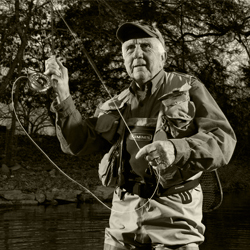
From then on, his grandmother fanned the flames of his budding love for fly fishing, purchasing a new rod and manual to get him started.
Beyond this, Dave Whitlock excelled in both the arts and sciences, and he recalls illustrating nature from his time as a high school student. After graduating from high school, he moved on to get degrees in chemistry, physics, and biology – later allowing him to work a government research job while dedicating his free time to fly fishing by exploring the areas around where he lived and worked.
He was no casual fisher, however, and he contributed to the fishing industry as a whole by finding better ways to hatch trout eggs by allowing them to hatch straight into the stream. The Phillips Petroleum Company moved to support his new method by developing the Whitlock-Vibert Box, which is now widely used for stream management worldwide.
Dave then went on to start writing about his experiences as a fly fisher, publishing his first piece in Field & Stream in 1958 entitled “The River That Has Everything.”
His career snowballed after that, and he began writing for various specialty publications and developed books that were considered to be “bibles” of fly fishing, such as "Dave Whitlock’s Guide to Aquatic Trout Food," "The L.L.Bean Fly Fishing Handbook," "The L.L.Bean Bass Fly Fishing Handbook," and "Imitating and Fishing Natural Fish Foods." His latest addition is "Artful Profiles of Trout, Salmon, and Char."
Wisdom from the Pages: Lessons from Oklahoma's Literary Legends
In the vibrant tapestry of Oklahoma's literary history, Angie Debo, Michael Wallis, Guy Logsdon, and Dave Whitlock offer timeless lessons. Debo's resilience urges writers to confront discrimination, persevere, and seize every opportunity. Wallis champions self-belief, resilience, and the beauty of unexpected opportunities. Logsdon's journey illustrates that passion, even initially overlooked, can shape history. Whitlock's fly-fishing odyssey teaches the transformative power of resilience, nature, and finding joy in unexpected places.
For students and educators, these lessons echo the importance of embracing our unique paths, amplifying our voices, and casting our lines into the vast ocean of possibilities. Oklahoma's literary legacy invites us to discover wisdom in the stories we tell and the lives we lead.


